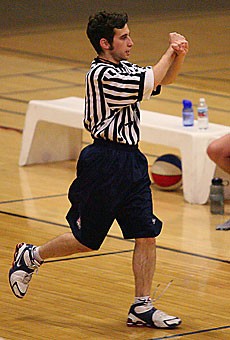It seems like every time I play an intramural playoff game, the officials find a way to screw things up for my team. Or at least that’s how it looks from my perspective.
After past playoff losses, I’ve complained bitterly, protested the games for so-called reasons I knew had no chance in hell of being successful (they still haven’t overturned one yet), and urged the officials’ supervisor to do something – anything to make things right for my team.
At the conclusion of one of my tirades after a basketball playoff game last year, current intramural basketball coordinator Ashley Gilpin had a simple message for me: If I thought I could do a better job, I was more than welcome to try my hand at it.
So with intramural basketball playoffs starting up two weeks ago, I took Gilpin up on her offer and donned the stripes.
But before Arizona Intramurals gave me a game, I had to complete training that all refs go through.
Typically this involves three nights of classroom work reading officiating guides, another night of stations on the court and two more sessions officiating scrimmages. But for time’s sake, Gilpin and I spent two days reading through a semester’s worth of officiating packets, from national high school rulebooks to the Arizona Intramurals guide.
Then I had to pass a 100-question true-or-false test, needing a 70 percent score. I thought it would be a piece of cake because it was open-book and because I’ve always thought I could officiate better than the “”Three Blind Mice”” who show up at NBA arenas across the country on occasion.
But who really knows if “”the difference between the penalty administration for an intentional foul and a technical foul is the designated spot where the ball is thrown in””? I also learned that it’s true that “”faking being fouled is an example of an unsporting foul.”” (Good thing one ref from a game I played in earlier this year didn’t realize that one.)
I passed the test, but before getting my own game, I also shadowed a more experienced official – literally following his every move to get the feel of officiating. (Arizona Intramurals makes all officials do it before letting them on the floor by themselves.)
After paying $5 for my very own FOX 40 whistle and borrowing a pair of pinstripes, I was ready to go.
It’s not as easy as it looks.
Calls that look simple from your couch in a college basketball game or on the court in intramurals aren’t the same when you’re the one having to make a split-second decision. If you’re slow to blow the whistle, the ball can wind up on the other end of the court in an instant.
On one play, a player reached in and got a decent piece of body before taking the ball and racing down court on a fast break. Before I had time to consider whether this warranted a foul – which it probably did – the action had long passed me by. I guess it’s easier to tell what a hack is when you actually feel the contact.
Just like the players, the referees must be mentally prepared. You’ve got to keep your eyes on the entire floor and anticipate the action. As I learned, that whistle better be in your mouth at all times or the call will be late.
Even simple hand motions are different as a referee. When one player called a timeout by motioning a “”T”” with his hands, I mistakenly mimicked that action in reporting the timeout to the official scorers, using that same familiar timeout “”T”” motion I’ve grown up using for a timeout.
The only problem was that by doing so I was calling for a technical foul instead of a simple timeout. (Luckily, the scorer knew I was a rookie.)
Things fans and players often don’t appreciate are magnified when one actually becomes a ref, such as how the lead official better be able to run faster than the players to be in appropriate position to call the game.
(In intramurals there are two officials, the lead and the trail, with the lead staying ahead of the play at all times and standing on the baseline, while the trail stands behind the action on the opposite side during a possession.)
Then there’s the enormous pressure on referees’ shoulders not to mess up, which I felt despite the fact that I officiated a low-key game that started 20-0 before anybody blinked. It’s a thankless job to be an intramurals ref. You get paid minimum wage, have to sprint as much as the players, make split-second decisions and all the while have to deal with crybabies like me if you call a blocking foul instead of a charge in the crucial final minutes.
After experiencing what it’s like to be an intramural official, I promise never to scream at any of the refs again – well, at least until the next time they forget to call the foul that costs my team the playoffs.
Michael Schwartz is a journalism junior.
He can be reached at sports@wildcat.arizona.edu.









